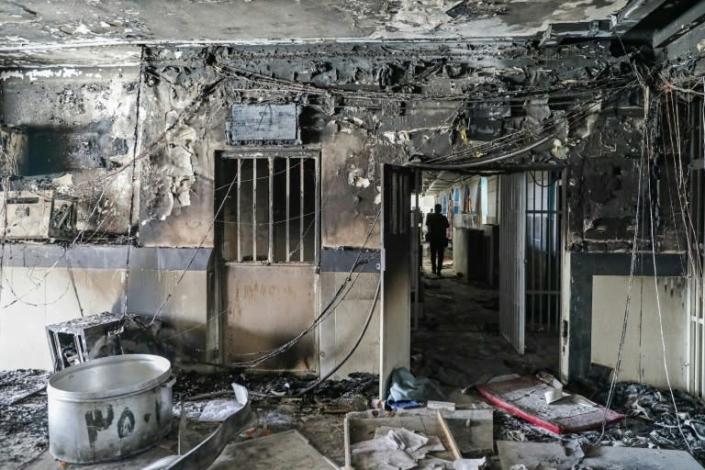
Eight inmates died in a fire that raged in Iran’s Evin prison, the judiciary said Monday, doubling the official toll from a blaze that has further stoked tensions one month into protests sparked by the death of Mahsa Amini.
Authorities blamed the fire in the Tehran jail late Saturday on “riots and clashes” among prisoners, but human rights groups said they doubted the official version of events and feared the real toll could be higher.
The judiciary authority’s website Mizan Online said Monday that four inmates injured in the fire had died in hospital, after reporting the previous day an initial toll of four dead from smoke inhalation.
Gunshots and explosions were heard during the dramatic blaze from inside the complex, according to social media footage, and state media later broadcast images of parts of the prison gutted by the flames.


Iranian authorities have accused “thugs” of torching a prison clothing depot and reported clashes between prisoners, and then between inmates and guards who intervened to put an end to the violence.
Judiciary chief Gholamhossein Mohseni Ejei said Monday that the fire was “a crime committed by a few elements linked to the enemy”.


But Norway-based group Iran Human Rights (IHR) said it “rejects” the official account of clashes between non-political prisoners unrelated to the protests, citing the “long history of concealing facts” in the Islamic republic.
“The number of those killed in Evin Prison is probably higher than the official count,” it added.
Activists noted further confusion when state television announced Sunday that 40 people had been killed in the prison, only to correct this back to the initial toll of four just minutes later.
IHR said many prisoners had been transferred to Gohardasht prison in Karaj, west of Tehran, in the aftermath of the fire.
– ‘Machinery of repression’ –
The fire came after four weeks of protests over the death of 22-year-old Amini, following her arrest for allegedly violating Iran’s strict dress code for women.


The wave of demonstrations has turned into a major anti-government movement, confronting Iran’s clerical leadership with one of its biggest challenges since the ousting of the shah in 1979.
At least 122 people have been killed in the crackdown on the Amini protests, and at least 93 more died in separate clashes in Zahedan, Sistan-Baluchestan province, according to an updated toll published by IHR. These tolls include 27 children, it added.
More than 40 human rights groups, including Amnesty International, Human Rights Watch and IHR in a joint statement Monday condemned Iran’s “mobilisation of their well-honed machinery of repression to ruthlessly crack down” on the nationwide protests.
They called on the Geneva-based UN Human Rights Council to hold a special session and “establish an independent, investigative reporting and accountability mechanism” to probe the rights violations.
The New York-based Center for Human Rights in Iran (CHRI) posted videos of new protests on Monday with schoolchildren shouting slogans against the government in the city of Isfahan, and students protesting in Mazandaran University in northern Iran.
– ‘Not close our eyes’ –
Hundreds of the protesters arrested in recent weeks have been sent to Evin, joining thousands of existing inmates who range from criminal convicts to political prisoners and foreigners.


Freedom of expression activist Hossein Ronaghi called his mother from Evin, where he has been held since last month, and “could hardly speak and could only say a few words,” his brother Hassan wrote on Twitter.
His family says he has suffered ill-treatment in custody and has fractured both legs.
But the wife of activist Majid Tavakoli, likewise arrested during the crackdown, wrote on Twitter that she had no news from her husband since the fire.
Prominent Iranian lawyer Saeid Dehghan wrote on Twitter that a total of 19 lawyers who had been working to defend those arrested had themselves been detained.
European Union foreign ministers endorsed new sanctions on Monday — including visa bans and asset freezes — targeting the morality police, Information Minister Eisa Zarepour and the cyber division of its Revolutionary Guards.
“When you see these terrible pictures of the fire in the prison, when you see that peaceful people, women, men and, increasingly, young people and schoolchildren continue to be brutally beaten then we cannot and will not close our eyes to this,” German Foreign Minister Annalena Baerbock said.
Iran’s foreign ministry spokesman Naser Kanani said Tehran would give an “immediate response” to the sanctions. The United States, Britain and Canada have already announced sanctions against Iran over rights violations.
bur-sjw/pjm




